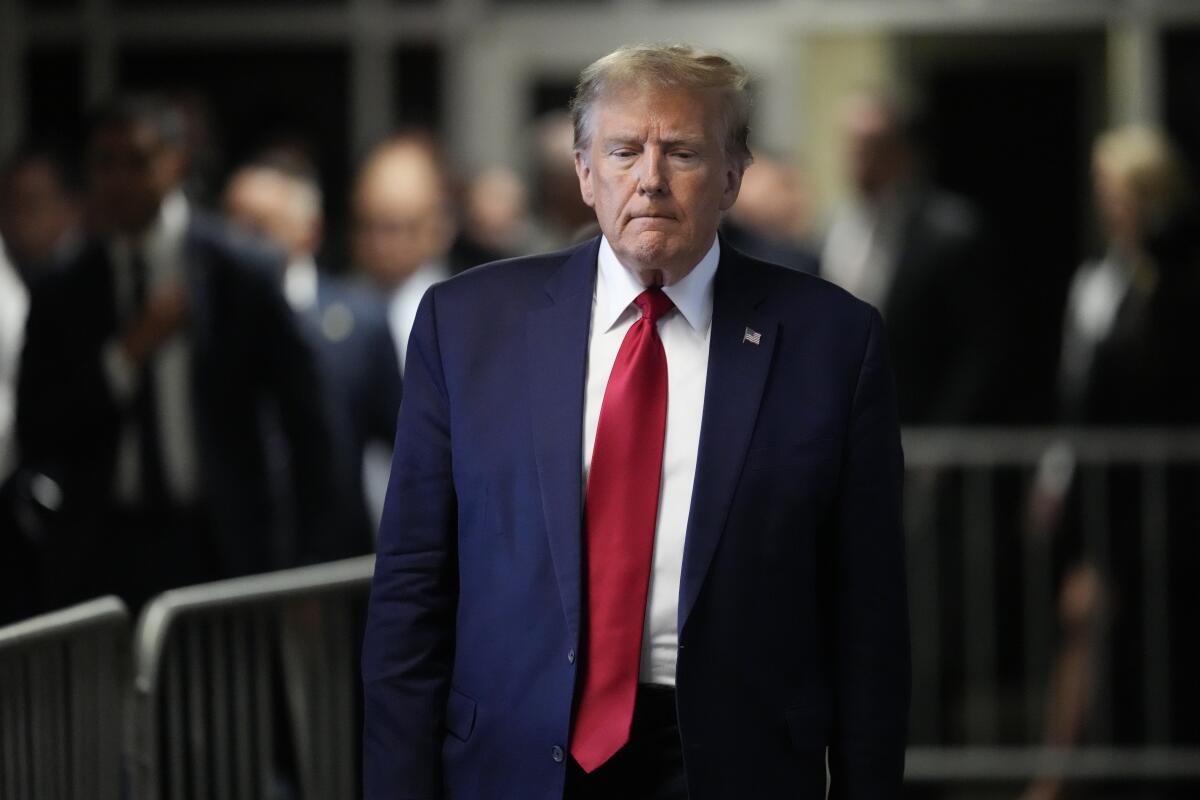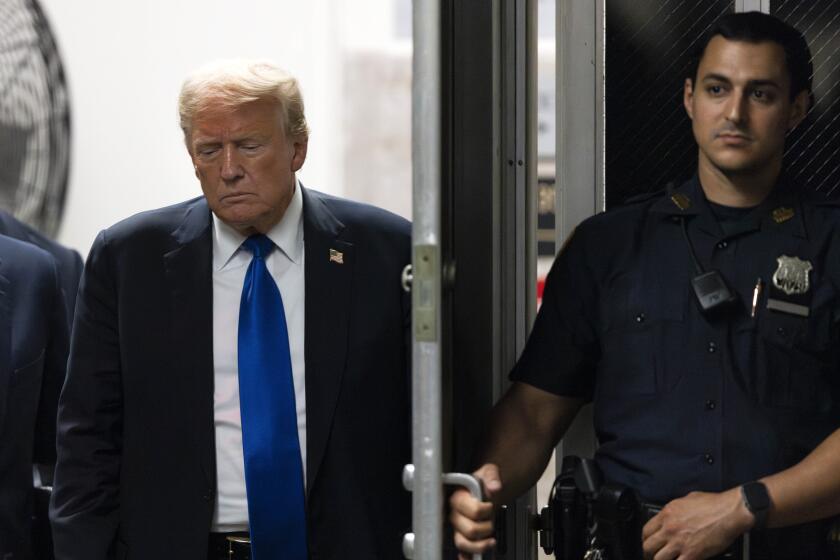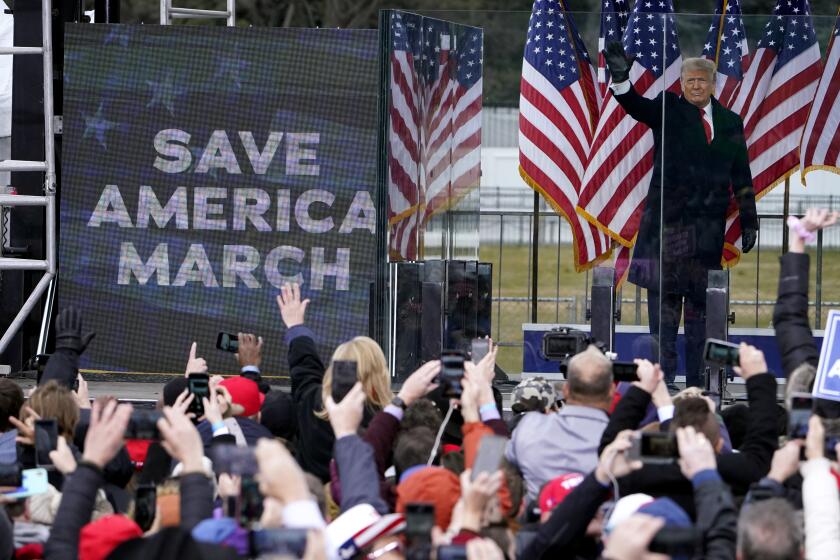New York prosecutors say they will oppose dismissing Trump’s hush money conviction

- Share via
NEW YORK — New York prosecutors said Tuesday they’ll oppose any effort to dismiss President-elect Donald Trump’s felony hush money conviction as his sentencing looms, but they expressed some openness to delaying the case until after his impending second term.
In a court filing Tuesday, the Manhattan district attorney’s office said Trump’s forthcoming presidency is not grounds for dropping a case that was already tried. But “given the need to balance competing constitutional interests,” prosecutors said, “consideration must be given” to potentially freezing the case until after he’s out of office.
Trump was convicted in May of 34 felony counts for falsifying business records to cover up a scheme to influence the 2016 election by paying hush money to a porn actor who said they’d had sex.
Jurors deliberated for 9½ hours over two days before convicting former President Trump of all 34 counts he faced in a hush-money scheme surrounding the 2016 election.
Judge Juan M. Merchan had given prosecutors until Tuesday to weigh in on how to proceed with the case. Trump had been scheduled for sentencing Nov. 26.
Prosecutors told Merchan in a letter Tuesday that they “are mindful of the demands and obligations of the presidency” and realize that Trump’s return to the White House “will raise unprecedented legal questions.”
“We also deeply respect the fundamental role of the jury in our constitutional system,” they added.
Proceedings were paused last week after defense lawyers urged the judge to dismiss the case “to avoid unconstitutional impediments” to Trump’s ability to run the country.
Merchan has not said when he will decide. Trump is due to be sworn in Jan. 20.
In pausing proceedings, the judge delayed a ruling on Trump’s earlier bid to reverse his conviction based on a U.S. Supreme Court decision in July that gave presidents broad immunity from criminal prosecution.
The nation’s high court refuses to decide quickly on Trump’s claim that he cannot be prosecuted for the Jan. 6 attack on the U.S. Capitol.
A dismissal would erase Trump’s historic conviction, sparing him the cloud of a criminal record as well as a possible prison sentence.
Merchan could also decide to delay the case for some other length of time, wait until a federal appeals court rules on Trump’s parallel effort to get the case moved out of state court, or choose some other option.
Trump was convicted of 34 counts of falsifying business records to conceal a $130,000 hush money payment to porn actor Stormy Daniels to suppress her claim that they’d had sex a decade earlier. Trump denies any affair. The payment was made shortly before the 2016 election.
Donald Trump’s attorneys unsuccessfully pushed for a mistrial during the testimony of porn actor Stormy Daniels.
Prosecutors cast the payout to Daniels as part of a Trump-driven effort to keep voters from hearing salacious stories about him. Trump’s then-lawyer, Michael Cohen, made the payoffs. Trump later reimbursed him, and Trump’s company logged the reimbursements as legal expenses — concealing what they really were, prosecutors said.
Trump has pledged to appeal the verdict if the case is not dismissed. He and his lawyers said the payments to Cohen were properly categorized as legal expenses for legal work.
Trump’s lawyers have been fighting for months to reverse his conviction.
A month after the verdict, the Supreme Court ruled that ex-presidents can’t be prosecuted for official acts — things they did in the course of running the country — and that prosecutors can’t cite those actions to bolster a case centered on purely personal, unofficial conduct.
Trump’s lawyers cited the ruling in arguing that the hush money jury got some improper evidence, such as Trump’s presidential financial disclosure form, testimony from some White House aides and social media posts made during his first term.
Prosecutors disagreed, saying the evidence in question was only “a sliver” of their case.
After Trump’s Nov. 5 election win, his lawyers redoubled their efforts, arguing that dismissing the case “in the interests of justice” was warranted both under the immunity ruling and due to his status as president-elect.
If the verdict stands and the case proceeds to sentencing, Trump’s punishments would range from a fine or probation to up to four years in prison — but it’s unlikely he’d spend any time behind bars for a first-time conviction involving charges in the lowest tier of felonies.
Trump, a Republican, decried the hush money verdict as a “rigged, disgraceful” result. He has claimed without evidence that the case was part of a Democratic-led “witch hunt” meant to harm his presidential campaign.
Some of Trump’s supporters embraced his conviction, showing up to campaign rallies in T-shirts with slogans such as “Free Trump” and “I’m voting for the convicted felon.”
Because it is a state case, Trump would not be able to pardon himself once he returns to office. Presidential pardons apply only to federal crimes.
The hush money case is the only one of Trump’s four criminal indictments to have gone to trial.
Justice Department special counsel Jack Smith is winding down his two federal cases against the president-elect. One centers on Trump’s efforts to overturn his 2020 election loss, the other on allegations that the former president hoarded classified documents at his Florida estate. A separate state election interference case in Fulton County, Ga., is largely on hold.
In civil cases still working their way through court, Trump is appealing payouts ordered after he repeatedly denied a writer’s allegations that he had sexually assaulted her in 1996. In 2023, a civil jury awarded E. Jean Carroll $5 million after finding Trump liable for sexual abuse and defamation. Trump called Carroll a “nut job” and “not my type.” She sued him again for defamation and won $83.3 million in damages. Trump is appealing the decisions.
Sisak writes for the Associated Press. AP writer Jennifer Peltz and Times staff contributed to this report.
More to Read
Get the L.A. Times Politics newsletter
Deeply reported insights into legislation, politics and policy from Sacramento, Washington and beyond. In your inbox twice per week.
You may occasionally receive promotional content from the Los Angeles Times.













